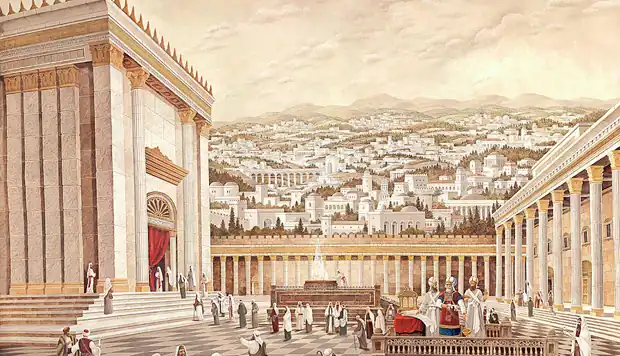Judaism has long taught that in the absence of the Holy Temple, there is always a sanctuary of sorts in our midst: “Every Jew should be a human temple."
Temple of the Holy Spirit
Is my body a temple of the Holy Spirit? Yes. In fact, according to the model of the Tabernacle and the teachings of the apostles, our personal temples contribute to a corporal sanctuary of God’s people (Eph. 2:19-22). In the book of Exodus, in the twenty-fifth chapter, God invites the entire nation of Israel to voluntarily contribute of their wealth and talents for the construction of the holy sanctuary (Ex. 25:2). In response to the heartfelt and overwhelming efforts of the people (36:5), God stated his intended purpose: “They shall make a sanctuary for me – so that I may dwell among them (25:8).” Interestingly, the Hebrew does not say “among them” as most translations imply, but it says, ושכנתי בתוכם, literally, ‘And I shall dwell within them (b’tochem).’ The implication is that God did not simply want to dwell in an inanimate edifice, but within the hearts of the Jewish people.
Judaism has long taught that in the absence of the Holy Temple, there is always a sanctuary of sorts in our midst: “Every Jew should be a human temple. If he is holy, his personal temple is holy; if he sins, he contaminates it (Scherman & Zlotowitz 1993, 569).” In that regard, we recognize that every aspect of human life has the potential to be elevated and infused with holiness. In the days of the Temple, the majority of the offerings served as food for the priests performing the services and the individuals drawing near for worship (1 Cor. 9:13). In the absence of the altar today, the Talmud teaches that a man’s table makes atonement (Hagigah 27a). That is to say that the center of our conversations, our sustenance, and daily behavior represent personal offerings of devotion and thanksgiving. In the same manner, the Apostle Paul wrote: “Therefore, whether you eat or drink, or whatever you do, do all to the glory of God (1 Cor. 10:31).” He also wrote concerning the redemption that has been procured for us by the atoning death of Yeshua: “You were bought at a price; therefore, glorify God in your body and in your spirit, which are God’s (1 Cor. 6:20).”
In the book of Ezekiel, the prophet warned Israel concerning the consequences of spiritual apathy, idolatry, and injustice: “Son of man, do you see what they are doing, the great abominations that the house of Israel commits here, to make Me go far away from My sanctuary? (Ez. 8:6).” Ezekiel spoke to a generation convinced that the Temple’s holiness, the habitat of God’s presence, would protect them from destruction and exile. However, Ezekiel stressed that the Divine Presence was gradually receding from the Temple. As we learn in Exodus 25-40, the Temple’s holiness was conditioned to the hearts of the people; when they lost their merit, it lost its holiness. Soon, the Temple would no longer be a temple, but merely a grand edifice, a shell devoid of sanctity. In this regard, Paul reminds all believers: “Don't you know that you yourselves are God's temple and that God's Spirit dwells in your midst? (1 Cor. 3:16).” The question of whether we are temples is self-evident. The real question is, are we offering our bodies and livelihood as a living sacrifice, holy, and accepting to God? This, after all, is our reasonable service (Rm. 12:1-2).


